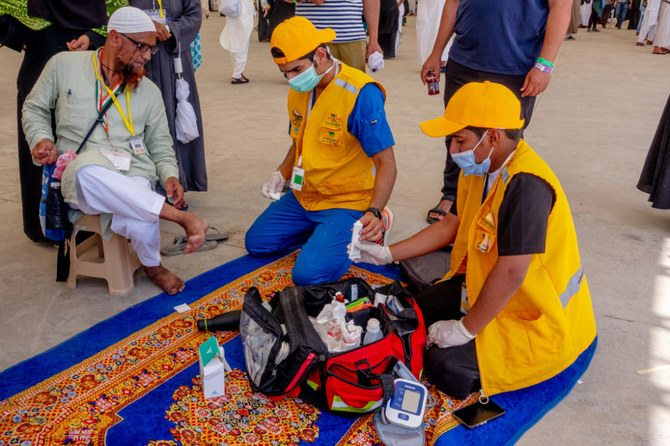MINA: During the final days of Hajj, medical volunteers with the Salem bin Mahfouz Foundation offered pilgrims treatment so they could complete their journey.
“It feels great to help out,” Ghaida Abdullah, one of the volunteers, said.
“We have been preparing for about a week to provide medical services to pilgrims. It comes with great responsibility, but it is a nice feeling to give back using all the knowledge you’ve acquired — to be able to serve people and have them wish you well.”
Abdullah, a 22-year-old medical student at King Abdulaziz University in Jeddah, came to Makkah with other medical students to treat pilgrims nearing the end of their Hajj rituals.
“We provide health and medical services for any situation that pilgrims may face due to high temperatures, or any chronic disease (complications) they may experience due to sweat or high temperatures,” she said.
Abdullah and her fellow volunteers finished treating one pilgrim for burns before they shared their experience with Arab News.
“We sanitize and dress the burns, and if need be we will transfer (the patient) to a health center. Otherwise, we will try to change the dressing tomorrow,” she said.
Volunteers often treat pilgrims returning to Jamarat for Tashreeq days, the three days of ritual following the first day of Eid Al-Adha.
Nishatha Fatima Abdul Majeed, 42, and her husband, Abdul Majeed Zaheer, 50, from India were treated for leg pain.
“The medical treatment we got here was excellent and gave us relief for the time being,” Zaheer said.
“We thank the Saudi government, we thank the news channels who have been supporting, and who have been working day and night for these particular Hajj people,” he said.
In between caring for patients, the medical volunteers distributed cold water to keep the pilgrims hydrated on their journey.
Heat exhaustion, dehydration, swelling, blisters and minor wounds were among the most common problems volunteers encountered.
The volunteers said that they feel honored to assist the pilgrims and hope to return in the future.
































